 Tìm kiếm
Tìm kiếm
Chương I Luật người cao tuổi năm 2009: Những quy đinh chung
| Số hiệu: | 39/2009/QH12 | Loại văn bản: | Luật |
| Nơi ban hành: | Quốc hội | Người ký: | Nguyễn Phú Trọng |
| Ngày ban hành: | 23/11/2009 | Ngày hiệu lực: | 01/07/2010 |
| Ngày công báo: | 25/03/2010 | Số công báo: | Từ số 131 đến số 132 |
| Lĩnh vực: | Văn hóa - Xã hội | Tình trạng: | Còn hiệu lực |
TÓM TẮT VĂN BẢN
Văn bản tiếng việt
Văn bản tiếng anh
Luật này quy định về quyền và nghĩa vụ của người cao tuổi; trách nhiệm của gia đình, Nhà nước và xã hội trong việc phụng dưỡng, chăm sóc và phát huy vai trò người cao tuổi; Hội người cao tuổi Việt Nam.
Người cao tuổi được quy định trong Luật này là công dân Việt Nam từ đủ 60 tuổi trở lên.
1. Người cao tuổi có các quyền sau đây:
a) Được bảo đảm các nhu cầu cơ bản về ăn, mặc, ở, đi lại, chăm sóc sức khoẻ;
b) Quyết định sống chung với con, cháu hoặc sống riêng theo ý muốn;
c) Được ưu tiên khi sử dụng các dịch vụ theo quy định của Luật này và các quy định khác của pháp luật có liên quan;
d) Được tạo điều kiện tham gia hoạt động văn hoá, giáo dục, thể dục, thể thao, giải trí, du lịch và nghỉ ngơi;
đ) Được tạo điều kiện làm việc phù hợp với sức khoẻ, nghề nghiệp và các điều kiện khác để phát huy vai trò người cao tuổi;
e) Được miễn các khoản đóng góp cho các hoạt động xã hội, trừ trường hợp tự nguyện đóng góp;
g) Được ưu tiên nhận tiền, hiện vật cứu trợ, chăm sóc sức khỏe và chỗ ở nhằm khắc phục khó khăn ban đầu khi gặp khó khăn do hậu quả thiên tai hoặc rủi ro bất khả kháng khác;
h) Được tham gia Hội người cao tuổi Việt Nam theo quy định của Điều lệ Hội;
i) Các quyền khác theo quy định của pháp luật.
2. Người cao tuổi có các nghĩa vụ sau đây:
a) Nêu gương sáng về phẩm chất đạo đức, lối sống mẫu mực; giáo dục thế hệ trẻ giữ gìn và phát huy truyền thống tốt đẹp của dân tộc; gương mẫu chấp hành và vận động gia đình, cộng đồng chấp hành chủ trương, đường lối của Đảng, pháp luật của Nhà nước;
b) Truyền đạt kinh nghiệm quý cho thế hệ sau;
c) Các nghĩa vụ khác theo quy định của pháp luật.
1. Bố trí ngân sách hằng năm phù hợp để thực hiện chính sách chăm sóc và phát huy vai trò người cao tuổi.
2. Bảo trợ xã hội đối với người cao tuổi theo quy định của Luật này và các quy định khác của pháp luật có liên quan.
3. Lồng ghép chính sách đối với người cao tuổi trong chính sách phát triển kinh tế - xã hội.
4. Phát triển ngành lão khoa đáp ứng nhu cầu khám bệnh, chữa bệnh cho người cao tuổi; đào tạo nhân viên chăm sóc người cao tuổi.
5. Khuyến khích, tạo điều kiện cho người cao tuổi rèn luyện sức khoẻ; tham gia học tập, hoạt động văn hoá, tinh thần; sống trong môi trường an toàn và được tôn trọng về nhân phẩm; phát huy vai trò người cao tuổi trong sự nghiệp xây dựng và bảo vệ Tổ quốc.
6. Khuyến khích, hỗ trợ cơ quan, tổ chức, cá nhân thực hiện tuyên truyền, giáo dục ý thức kính trọng, biết ơn người cao tuổi, chăm sóc, phát huy vai trò người cao tuổi.
7. Khen thưởng cơ quan, tổ chức, cá nhân có thành tích xuất sắc trong việc chăm sóc, phát huy vai trò người cao tuổi.
8. Xử lý nghiêm minh cơ quan, tổ chức, cá nhân có hành vi vi phạm quy định của Luật này và các quy định khác của pháp luật có liên quan.
1. Cơ quan tổ chức trong phạm vi nhiệm vụ, quyền hạn của mình có trách nhiệm chăm sóc, bảo vệ quyền và lợi ích hợp pháp của người cao tuổi.
2. Mặt trận Tổ quốc Việt Nam và các tổ chức thành viên, các tổ chức khác có trách nhiệm tuyên truyền, vận động nhân dân nâng cao trách nhiệm chăm sóc và phát huy vai trò người cao tuổi; tham gia giám sát việc thực hiện chính sách, pháp luật về người cao tuổi.
3. Gia đình người cao tuổi có trách nhiệm chủ yếu trong việc phụng dưỡng người cao tuổi.
4. Cá nhân có trách nhiệm kính trọng và giúp đỡ người cao tuổi.
Ngày 06 tháng 6 hằng năm là Ngày người cao tuổi Việt Nam.
1. Quỹ chăm sóc và phát huy vai trò người cao tuổi là quỹ xã hội, từ thiện.
2. Quỹ chăm sóc và phát huy vai trò người cao tuổi được hình thành từ các nguồn sau đây:
a) Đóng góp tự nguyện, tài trợ của tổ chức, cá nhân trong nước và nước ngoài;
b) Hỗ trợ từ ngân sách nhà nước;
c) Các khoản thu hợp pháp khác.
3. Việc thành lập, hoạt động và quản lý Quỹ chăm sóc và phát huy vai trò người cao tuổi được thực hiện theo quy định của pháp luật.
1. Hợp tác quốc tế về người cao tuổi được thực hiện trên cơ sở tôn trọng độc lập, chủ quyền, toàn vẹn lãnh thổ, bình đẳng, phù hợp với pháp luật Việt Nam và pháp luật quốc tế.
2. Nội dung hợp tác quốc tế về người cao tuổi bao gồm:
a) Xây dựng và thực hiện chương trình, dự án hợp tác quốc tế về người cao tuổi;
b) Tham gia tổ chức quốc tế; ký kết, gia nhập và thực hiện điều ước quốc tế, thỏa thuận quốc tế liên quan đến người cao tuổi;
c) Trao đổi thông tin, kinh nghiệm về chăm sóc và phát huy vai trò người cao tuổi.
1. Lăng mạ, ngược đãi, xúc phạm, hành hạ, phân biệt đối xử đối với người cao tuổi.
2. Xâm phạm, cản trở người cao tuổi thực hiện quyền về hôn nhân, quyền về sở hữu tài sản và các quyền hợp pháp khác.
3. Không thực hiện nghĩa vụ phụng dưỡng người cao tuổi.
4. Lợi dụng việc chăm sóc, phụng dưỡng người cao tuổi để vụ lợi.
5. Ép buộc người cao tuổi lao động hoặc làm những việc trái với quy định của pháp luật.
6. Ép buộc, kích động, xúi giục, giúp người khác thực hiện hành vi vi phạm pháp luật đối với người cao tuổi.
7. Trả thù, đe doạ người giúp đỡ người cao tuổi, người phát hiện, báo tin ngăn chặn hành vi vi phạm pháp luật đối với người cao tuổi.
GENERAL PROVISIONS
Article 1. This Law provides for the rights and obligations of the elderly; the responsibilities of families, the State and the society in taking care of. attending to. and bringing into full play the role of, the elderly; and the Vietnam Elderly Association.
The elderly defined in this Law are Vietnamese citizens aged full 60 or over.
Article 3. Rights and obligations of the elderly
1. The elderly have the following rights:
a/To be guaranteed with basic food, clothing, lodging, movement and healthcare needs;
b/ To decide to live with their children, grandchildren or to live separately at their own will;
c/To be given priority in the use of services under this Law and other relevant laws:
d/ To be provided with conditions to participate in cultural, educational, physical training, sports, entertainment, tourist and recreation activities;
e/ To be provided with conditions to work in suitability to their health and professions and other conditions in order to bring into full play their role;
f/ To be exempt from contributions to social activities, except voluntary contributions;
g/ To be given priority in the receipt of relief in cash or in kind, healthcare and lodgings with a view to overcoming initial difficulties when they meet with difficulties due to consequences of natural disasters or other force majeure circumstances;
h/ To join in the Vietnam Elderly Association under the Association's charter;
i/ Other rights defined by law.
2. The elderly have the following obligations:
a/To set bright examples in moral quality and lifestyles: to educate young generations to preserve and promote the fine traditions of the nation; to be exemplary in observing and mobilizing families and communities to observe the Party's policies and line and the State's laws;
b/ To pass their precious experiences to younger generations;
c/ Other obligations defined by law.
Article 4. The State's policies towards the elderly
1. To allocate appropriate annual budgets for the realization of policies to take care of and bring into full play the role of the elderly.
2. To provide social patronage to the elderly under this Law and other relevant laws.
3. To incorporate policies for the elderly into policies on socio-economic development.
4. To develop gerontology so as to meet the elderly's medical examination and treatment needs; to train personnel to take care of the elderly.
5. To encourage and create conditions for the elderly to do physical exercises; to participate in learning, cultural and spiritual activities: to live in a safe environment and be respected in dignity; to bring into play their role in the cause of national construction and defense.
6. To encourage and support agencies, organizations and individuals in carrying out propaganda on and education about the sense of respect for and gratitude to the elderly, taking care of and bringing into full play the role of the elderly.
7. To commend agencies, organizations and individuals that record outstanding achievements in taking care of and bringing into full play the role of the elderly.
8. To strictly handle agencies, organizations and individuals that commit acts of violating this Law and other relevant laws.
Article 5. Responsibilities of agencies, organizations, families and individuals
1. Agencies and organizations shall, within the ambit of their respective tasks and powers, take care of and protect the legitimate rights and interests of the elderly.
2. The Vietnam Fatherland Front and its member organizations and other organizations shall agitate and mobilize people to heighten the responsibility to take care of and bring into full play the role of the elderly: to participate in supervising the implementation of policies and laws on the elderly.
3. The elderly's families shall take the main responsibility in taking care of the elderly.
4. Individuals shall respect and help the elderly.
Article 6. Vietnam Elderly Day
June 6 every year is taken as the Vietnam Elderly Day.
Article 7. Funds for taking care of and bringing into full play the role of the elderly
1. Funds for taking care of and bringing into full play the role of the elderly arc social and charity funds.
2. Funds for taking care of and bringing into full play the role of the elderly come from the following sources:
a/ Voluntary contributions and financial aid of domestic and foreign organizations and individuals:
b/ State budget supports;
c/ Other lawful revenue sources.
3. The establishment, operation and management of the funds for taking care of and bringing into full play the role of the elderly must comply with law.
Article 8. International cooperation for the elderly
1. International cooperation for the elderly shall be carried out on the basis of respect for independence, sovereignty, territorial integrity, equality and conformity with Vietnamese law and international laws.
2. International cooperation for the elderly covers the following contents:
a/ Formulation and materialization of programs and projects of international cooperation on the elderly;
b/ Participation in international organizations; conclusion, accession to and implementation of treaties and international agreements related to the elderly;
c/ Exchange of information and experiences on taking care of and promoting the role of the elderly.
1. Insulting, ill-treating or hurting, persecuting, discriminating against the elderly.
2. Infringing upon or preventing the elderly from exercising their rights to marriage, property ownership and other lawful rights.
3. Failing to perform the obligations of taking care of the elderly.
4. Taking advantage of the looking after and taking care of the elderly for self-seeking interests.
5. Forcing the elderly to labor or do things contrary to law.
6. Forcing, arousing, inciting or abetting other persons to commit illegal acts against the elderly.
7. Retaliating and intimidating persons who help the elderly or who detect, report on or prevent illegal acts against the elderly.
Văn bản liên quan
Cập nhật
Điều 11. Uỷ nhiệm chăm sóc người cao tuổi
Điều 14. Hoạt động văn hoá, giáo dục, thể dục, thể thao, giải trí và du lịch
Điều 15. Công trình công cộng, giao thông công cộng
Điều 16. Giảm giá vé, giá dịch vụ
Điều 18. Chính sách bảo trợ xã hội
Điều 20. Cơ sở chăm sóc người cao tuổi
Bài viết liên quan
Trên 80 tuổi có được lái xe ô tô B2 không mới nhất 2025?
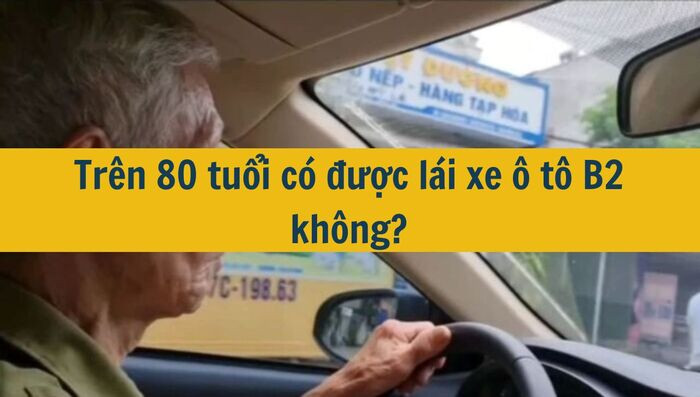
Trên 80 tuổi có được lái xe ô tô B2 không mới nhất 2025?
Từ ngày 01/01/2025, với sự ra đời của Luật Trật tự, an toàn giao thông đường bộ 2024, đã có nhiều quy định mới được ban hành, trong đó đặc biệt là các quy định liên quan đến giấy phép lái xe. Vậy theo quy định mới nhất, trên 80 tuổi có được lái xe ô tô B2 không? Hãy cùng theo dõi bài viết sau để tìm được câu trả lời chính xác nhất. 03/03/202565 tuổi có được thi bằng lái xe B2 không mới nhất 2025?
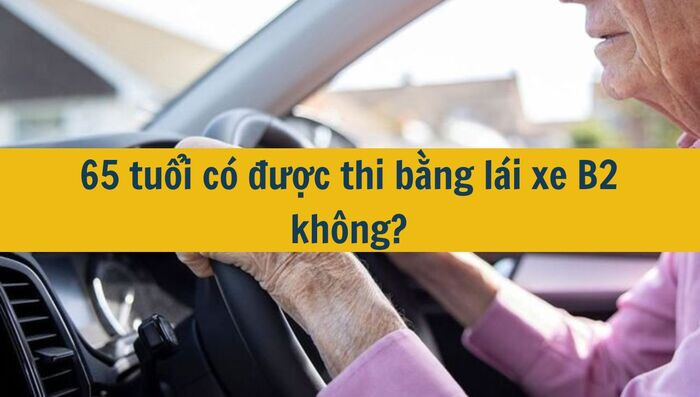
65 tuổi có được thi bằng lái xe B2 không mới nhất 2025?
Từ ngày 01/01/2025, với sự ra đời của Luật Trật tự, an toàn giao thông đường bộ 2024, đã có nhiều quy định mới được ban hành, trong đó đặc biệt là các quy định liên quan đến giấy phép lái xe. Vậy theo quy định mới nhất, trên 65 tuổi có được thi bằng lái xe B2 không? Hãy cùng theo dõi bài viết sau để tìm được câu trả lời chính xác nhất. 03/03/2025Trên 60 tuổi có được lái xe ô tô B1 không mới nhất 2025?
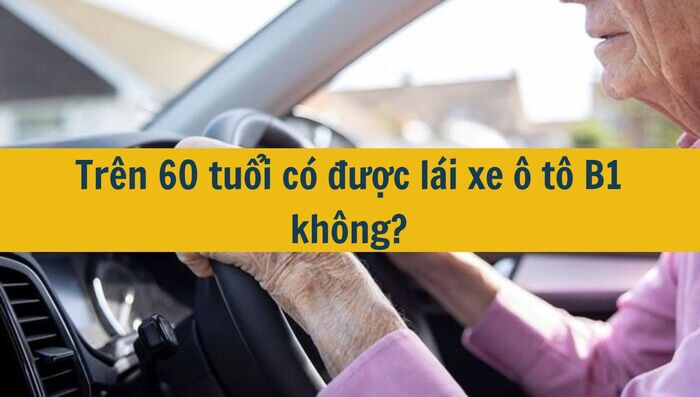
Trên 60 tuổi có được lái xe ô tô B1 không mới nhất 2025?
Từ ngày 01/01/2025, với sự ra đời của Luật Trật tự, an toàn giao thông đường bộ 2024, đã có nhiều quy định mới được ban hành, trong đó đặc biệt là các quy định liên quan đến giấy phép lái xe. Vậy theo quy định mới nhất, trên 60 tuổi có được lái xe ô tô B1 không? Hãy cùng theo dõi bài viết sau để tìm được câu trả lời chính xác nhất. 03/03/2025Trên 60 tuổi có được lái xe ô tô C không mới nhất 2025?
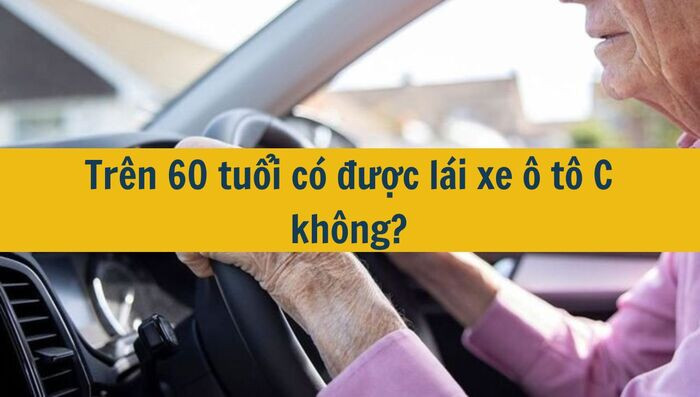
Trên 60 tuổi có được lái xe ô tô C không mới nhất 2025?
Từ ngày 01/01/2025, với sự ra đời của Luật Trật tự, an toàn giao thông đường bộ 2024, đã có nhiều quy định mới được ban hành, trong đó đặc biệt là các quy định liên quan đến giấy phép lái xe. Vậy theo quy định mới nhất, trên 60 tuổi có được lái xe ô tô C không? Hãy cùng theo dõi bài viết sau để tìm được câu trả lời chính xác nhất. 03/03/2025Trên 70 tuổi có được lái xe ô tô B2 không mới nhất 2025?
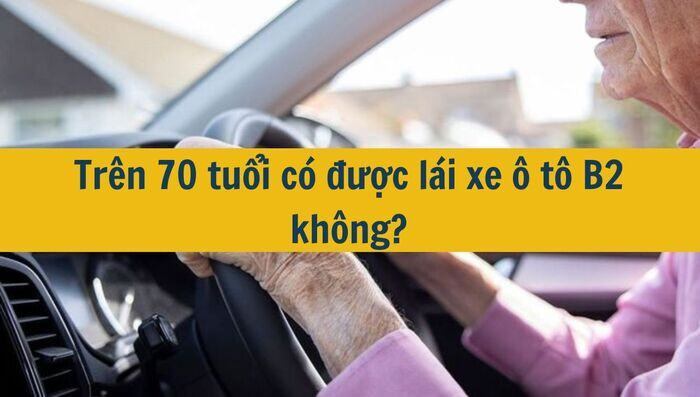
Trên 70 tuổi có được lái xe ô tô B2 không mới nhất 2025?
Từ ngày 01/01/2025, với sự ra đời của Luật Trật tự, an toàn giao thông đường bộ 2024, đã có nhiều quy định mới được ban hành, trong đó đặc biệt là các quy định liên quan đến giấy phép lái xe. Vậy theo quy định mới nhất, trên 70 tuổi có được lái xe ô tô B2 không? Hãy cùng theo dõi bài viết sau để tìm được câu trả lời chính xác nhất. 03/03/2025Trên 70 tuổi có được lái xe ô tô B1 không mới nhất 2025?
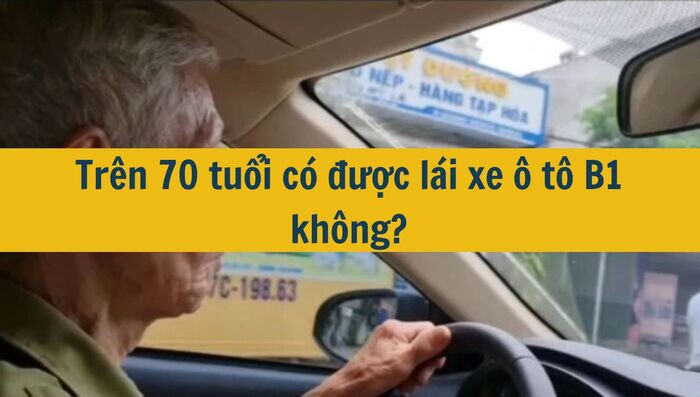
Trên 70 tuổi có được lái xe ô tô B1 không mới nhất 2025?
Từ ngày 01/01/2025, với sự ra đời của Luật Trật tự, an toàn giao thông đường bộ 2024, đã có nhiều quy định mới được ban hành, trong đó đặc biệt là các quy định liên quan đến giấy phép lái xe. Vậy theo quy định mới nhất, trên 70 tuổi có được lái xe ô tô B1 không? Hãy cùng theo dõi bài viết sau để tìm được câu trả lời chính xác nhất. 03/03/2025Người trên 60 tuổi có được lái xe ô tô 7 chỗ không mới nhất 2025?
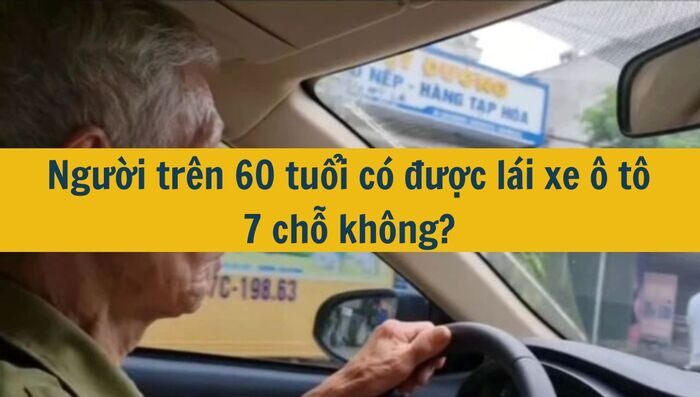
Người trên 60 tuổi có được lái xe ô tô 7 chỗ không mới nhất 2025?
Từ ngày 01/01/2025, với sự ra đời của Luật Trật tự, an toàn giao thông đường bộ 2024, đã có nhiều quy định mới được ban hành, trong đó đặc biệt là các quy định liên quan đến giấy phép lái xe. Vậy theo quy định mới nhất, trên 60 tuổi có được lái xe ô tô B2 không? Hãy cùng theo dõi bài viết sau để tìm được câu trả lời chính xác nhất. 03/03/2025Trên 60 tuổi có bị hạ bằng lái xe hạng D không mới nhất 2025?

Trên 60 tuổi có bị hạ bằng lái xe hạng D không mới nhất 2025?
Từ ngày 01/01/2025, với sự ra đời của Luật Trật tự, an toàn giao thông đường bộ 2024, đã có nhiều quy định mới được ban hành, trong đó đặc biệt là các quy định liên quan đến giấy phép lái xe. Vậy theo quy định mới nhất, trên 60 tuổi có bị hạ bằng lái xe hạng D không? Hãy cùng theo dõi bài viết sau để tìm được câu trả lời chính xác nhất. 03/03/2025Bằng FC bao nhiêu tuổi thì hết hạn mới nhất 2025?
Bằng FC bao nhiêu tuổi thì hết hạn mới nhất 2025?
Từ ngày 01/01/2025, với sự ra đời của Luật Trật tự, an toàn giao thông đường bộ 2024, đã có nhiều quy định mới được ban hành, trong đó đặc biệt là các quy định liên quan đến giấy phép lái xe. Vậy theo quy định mới nhất, bằng FC bao nhiêu tuổi thì hết hạn? Hãy cùng theo dõi bài viết sau để tìm được câu trả lời chính xác nhất. 03/03/2025Bao nhiêu tuổi hết hạn chạy xe hạng C mới nhất 2025?
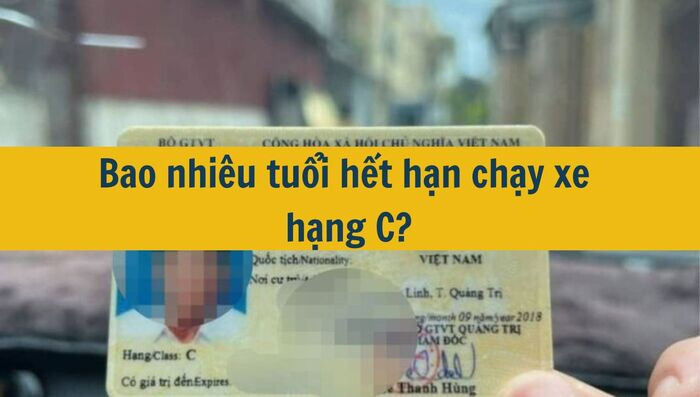

 Luật người cao tuổi năm 2009 (Bản Word)
Luật người cao tuổi năm 2009 (Bản Word)
 Luật người cao tuổi năm 2009 (Bản Pdf)
Luật người cao tuổi năm 2009 (Bản Pdf)